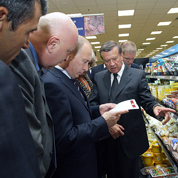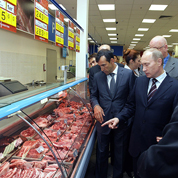A display of 'mechanical management' of economy against market forces

Expectedly, the prime minister was shocked by the egregiously exorbitant price tags, as profit margins on goods were defined merely by the ‘insatiable appetite’ of the store’s management, rather than by the equilibrium derived from the interactions of the traditional free-market economic forces of demand and supply. Confronted with a logical question, “are such exorbitant prices fair?”, the store management did not even attempt to explain the excessive prices with the traditional default reasons such as high rents, greedy middlemen and their monopolistic services, escalating utility bills and cost of labor, unfair taxation system, etc., but simply promised to significantly lower the prices.
Keeping its word, the retail chain later issued an official statement saying it had slashed its profit margins to just 0%-5% with plans to cut prices further by 30%-80% on over 3,000 assortments of products, effective from July. Such policy instigated a ‘bandwagon effect’ in the retail industry, as other retailers, afraid of similar visits from Putin and/or of being left on the wrong sides of rapidly growing market competition, also significantly ‘moderated their appetite’ on profit margins. While the positive effects produced by Putin’s surprise visit are favorable to consumers, especially at a time of a global economic meltdown, such ‘manual management’ of economy, however, raises several fundamental questions beginning for urgent answers.

Indeed, the fact that the retailers were more than willing to lower their prices by such wide margins, and thus, endure significant losses, without putting up any resistance, means that they had all along been ‘milking’ the consumers to their bones. And this leads to these logical questions: Why has this practice been allowed for a such long time, where were the official market regulators, and why did Putin himself has to come to solve an issue that in a normal economy could have been regulated by the Federal Antimonopoly Service and other related official agencies that only had to enforce the necessary laws on retail activities in the country? Besides, how does such ‘manual management’ of economy conform to the conventional free market principles, which stipulate, amongst others, that the value of a product, ceteris paribus, is the maximally optimal price that a ‘rational consumer/buyer’ is willing to pay for it, while that cost is a bye-product of the free interactions between the economic forces of supply and demand.
This old economic axiom reminds us of a recent event in Italy, where this very same argument was used by the Russian president, Dmitry Medvedev, against
western leaders’ proposal at the L’Aquila G8 Summit ‘to administratively fix the oil prices’ on the global markets for sometime, at least till the full recovery of the global economy from the current financial tsunamis. The paradox and, probably, the first key lesson from the current global economic crisis is that Russia has become the ‘guardian’ of fundamental free-market economic principles on the global arena, while at the same time, it can and does resort to the famous, time-tested Soviet policy of manual management of its economy or industries, where it deems necessary.
This double stance is, indeed, reminiscent of the Soviet era, where the Kremlin always had two different policies on any given issue — one for domestic use and the other for foreign audience. But today is a different world, and this is why full harmonization of the Kremlin’s domestic and foreign policies, especially on key economic issues, is very important, as it enables foreign businesses contemplating on investing in Russia to get a clearer picture of the exact nature of the free-market economy existing in the country.












 Web design,
Web design,